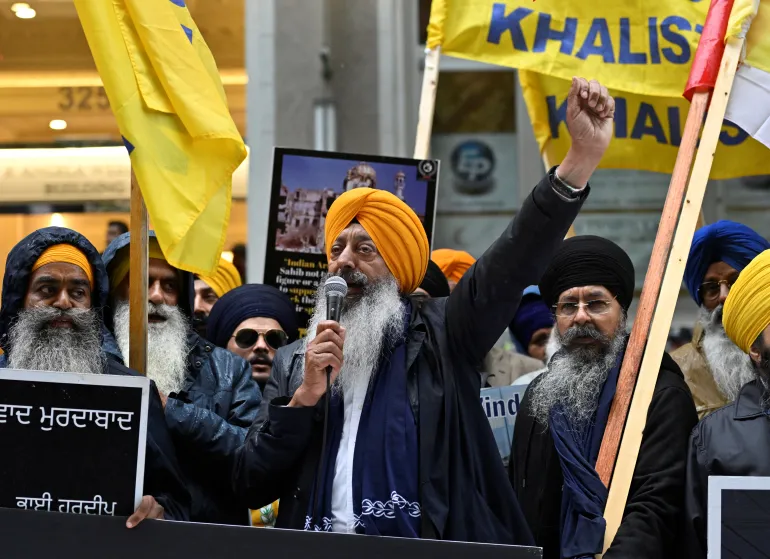Concerns have been expressed regarding human rights abuses and discriminatory activities by the Indian Government regarding the plight of Sikhs in India. Sikhs have endured historical marginalization, social-economic inequality, and structural prejudice as a unique religious community.
Delving into the historical backdrop of Sikh deprivation, the influence of the Khalistan Movement, the current concerns confronting Sikhs in India extend to the transnational issues impacting the Sikh diaspora across the globe.
Sikhism arose in a varied region, rife with religious disputes, opposing dominant power structures and pushing for egalitarian values. Because they rejected societal structures and stressed on individual liberties, Sikh Gurus experienced persecution during the Mughal Empire’s reign as well Sikhs faced prejudice under British colonial authority before India’s independence, restricting their access to education, employment, and political participation.
Also Read: Modi’s Draconian Policies Impacting Sikh Minority
Plight of Sikhs in India: Historical Marginalization and Modern Challenges
The Khalistan Movement, inspired by the desire for an autonomous Sikh country, emerged in the late 1970s. During the 1980s, the movement gained strength, resulting in deadly conflicts between separatist organizations and Indian security forces. Operation Blue Star, launched in 1984 to apprehend armed Sikh terrorists, caused significant harm to the Golden Temple grossly souring the Sikh-Hindu ties. Anti-Sikh riots erupted in the aftermath of Indira Gandhi’s assassination in 1984, resulting in widespread violence, trauma, and a lingering sense of victimization within the Sikh community.
Despite constitutional protections, social-economic inequality, political under-representation, and institutional discrimination, continue to plague Sikh community in India.
Lack of access to decent education and employment possibilities exacerbates their marginalization. Sikhs are also subjected to deliberate violence and hate crimes due to their distinct religious identity that perpetuates fear and insecurity. Systemic prejudice is evident in educational institutions, work, and public services, impeding community advancement even more.
The Sikh diaspora, which includes people from the United Kingdom, Canada, Australia, United States and UAE actively campaigns for Sikh rights and justice. Migration patterns are frequently influenced by historical, economic, and political considerations, as well as the desire for religious freedom. However, reports of activities targeting Sikh diaspora figures critical of the Indian Government have often appeared during the Modi rule. Surveillance, travel constraints, and allegations of harassment have sparked worries about dissent repression and human rights breaches.
Also Read: Sikh Minority in East Punjab: A Parallel to Kashmir
Advocacy and International Concerns
Human rights groups, foreign governments, and international entities have expressed concern over the treatment of Sikhs in India. Religious freedom, hate crimes, and the unfair treatment of minority populations, especially Sikhs, have all been raised. The Sikh diaspora continues to play an important role in raising awareness, advocating for justice, and assisting with legal attempts to solve the issues that Sikhs confront in India.
International attention has been drawn to the struggle of Sikhs in India, which has been distinguished by historical marginalization and modern obstacles. While worries about discrimination exist, the Sikh diaspora remained active in pushing for their rights. The international community’s caution and advocacy efforts are critical in resolving human rights violations and building a more inclusive and just society for India’s Sikh population.
The Sikh community has issues that reach beyond India, as Sikhs living abroad have also endured violence and discrimination.
Sikhs have been slain in other nations by persons linked with Hindu fundamentalist views, which is shocking. These occurrences emphasize the global character of the issues that Sikhs confront, as well as the need for enhanced awareness and international collaboration to combat religiously motivated violence. Such acts not only generate an atmosphere of anxiety and dread among the Sikh diaspora, but they also highlight the urgency of addressing the basic causes of intolerance and fostering religious peace on a worldwide basis. To preserve the safety and well-being of Sikhs and other minority populations living outside their native country, the international community must condemn and confront these acts.
The opinions shared in this article reflect the author’s personal views and do not necessarily align with the institution’s official stance.
Sara Nazir is an Islamabad-based researcher with a background in Strategic Studies & area of interest is non-traditional warfare. She can be reached on saranazeer2@gmail.com & @SaraNazir13 (on X).




